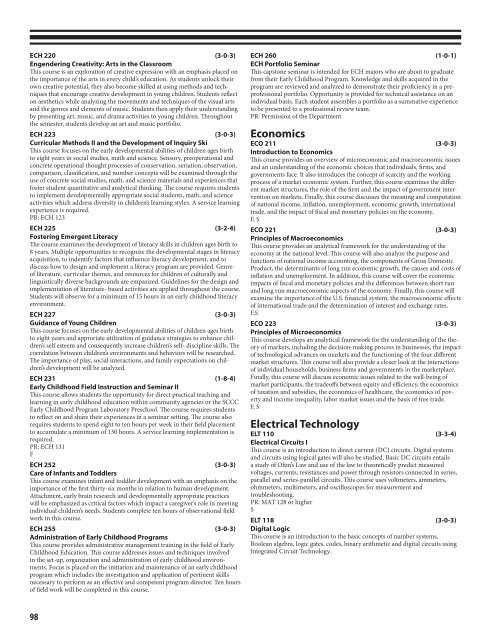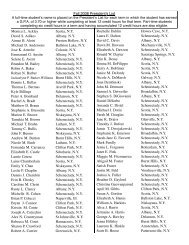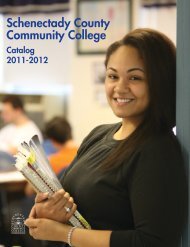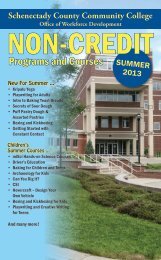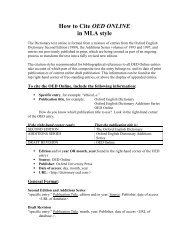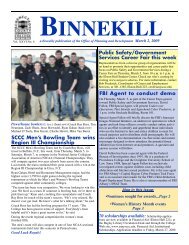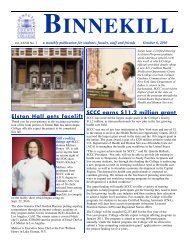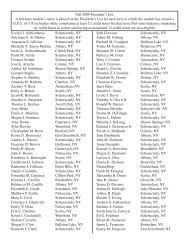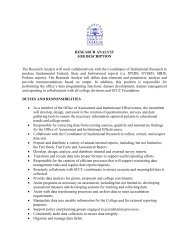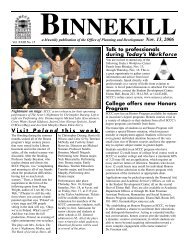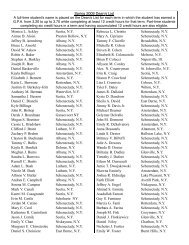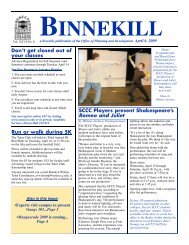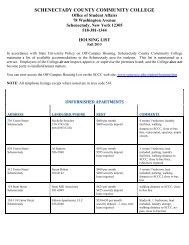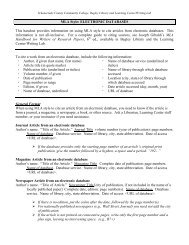CATALOG - Schenectady County Community College
CATALOG - Schenectady County Community College
CATALOG - Schenectady County Community College
Create successful ePaper yourself
Turn your PDF publications into a flip-book with our unique Google optimized e-Paper software.
ECH 220 (3-0-3)Engendering Creativity: Arts in the ClassroomThis course is an exploration of creative expression with an emphasis placed onthe importance of the arts in every child’s education. As students unlock theirown creative potential, they also become skilled at using methods and techniquesthat encourage creative development in young children. Students reflecton aesthetics while analyzing the movements and techniques of the visual artsand the genres and elements of music. Students then apply their understandingby presenting art, music, and drama activities to young children. Throughoutthe semester, students develop an art and music portfolio.ECH 223 (3-0-3)Curricular Methods II and the Development of Inquiry SkiThis course focuses on the early developmental abilities of children ages birthto eight years in social studies, math and science. Sensory, preoperational andconcrete operational thought processes of conservation, seriation, observation,comparison, classification, and number concepts will be examined through theuse of concrete social studies, math, and science materials and experiences thatfoster student quantitative and analytical thinking. The course requires studentsto implement developmentally appropriate social students, math, and scienceactivities which address diversity in children’s learning styles. A service learningexperience is required.PR: ECH 123ECH 225 (3-2-4)Fostering Emergent LiteracyThe course examines the development of literacy skills in children ages birth to8 years. Multiple opportunities to recognize the developmental stages in literacyacquisition, to indentify factors that influence literacy development, and todiscuss how to design and implement a literacy program are provided. Genreof literature, curricular themes, and resources for children of culturally andlinguistically diverse backgrounds are empasized. Guidelines for the design andimplementation of literature- based activities are applied throughout the course.Students will observe for a minimum of 15 hours in an early childhood literacyenvironment.ECH 227 (3-0-3)Guidance of Young ChildrenThis course focuses on the early developmental abilities of children ages birthto eight years and approriate utilization of guidance strategies to enhance children’sself esteem and consequently increase children’s self- discipline skills. Thecorrelation between children’s environments and behaviors will be researched.The importance of play, social interactions, and family expectations on children’sdevelopment will be analyzed.ECH 231 (1-8-4)Early Childhood Field Instruction and Seminar IIThis course allows students the opportunity for direct practical teaching andlearning in early childhood education within community agencies or the SCCCEarly Childhood Program Laboratory Preschool. The course requires studentsto reflect on and share their experiences in a seminar setting. The course alsorequires students to spend eight to ten hours per week in their field placementto accumulate a minimum of 130 hours. A service learning implementation isrequired.PR: ECH 131FECH 252 (3-0-3)Care of Infants and ToddlersThis course examines infant and toddler development with an emphasis on theimportance of the first thirty-six months in relation to human development.Attachment, early brain research and developmentally appropriate practiceswill be emphasized as critical factors which impact a caregiver’s role in meetingindividual children’s needs. Students complete ten hours of observational fieldwork in this course.ECH 255 (3-0-3)Administration of Early Childhood ProgramsThis course provides administrative management training in the field of EarlyChildhood Education. This course addresses issues and techniques involvedin the set-up, organization and administration of early childhood environments.Focus is placed on the initiation and maintenance of an early childhoodprogram which includes the investigation and application of pertinent skillsnecessary to perform as an effective and competent program director. Ten hoursof field work will be completed in this course.ECH 260 (1-0-1)ECH Portfolio SeminarThis capstone seminar is intended for ECH majors who are about to graduatefrom their Early Childhood Program. Knowledge and skills acquired in theprogram are reviewed and analyzed to demonstrate their proficiency in a preprofessionalportfolio. Opportunity is provided for technical assistance on anindividual basis. Each student assembles a portfolio as a summative experienceto be presented to a professional review team.PR: Permission of the DepartmentEconomicsECO 211 (3-0-3)Introduction to EconomicsThis course provides an overview of microeconomic and macroeconomic issuesand an understanding of the economic choices that individuals, firms, andgovernments face. It also introduces the concept of scarcity and the workingprocess of a market economic system. Further, this course examines the differentmarket structures, the role of the firm and the impact of government interventionon markets. Finally, this course discusses the meaning and computationof national income, inflation, unemployment, economic growth, internationaltrade, and the impact of fiscal and monetary policies on the economy.F, SECO 221 (3-0-3)Principles of MacroeconomicsThis course provides an analytical framework for the understanding of theeconomy at the national level. This course will also analyze the purpose andfunctions of national income accounting, the components of Gross DomesticProduct, the determinants of long run economic growth, the causes and costs ofinflation and unemployment. In addition, this course will cover the economicimpacts of fiscal and monetary policies and the differences between short runand long run macroeconomic aspects of the economy. Finally, this course willexamine the importance of the U.S. financial system, the macroeconomic effectsof international trade and the determination of interest and exchange rates.F,SECO 223 (3-0-3)Principles of MicroeconomicsThis course develops an analytical framework for the understanding of the theoryof markets, including the decision-making process in businesses, the impactof technological advances on markets and the functioning of the four differentmarket structures. This course will also provide a closer look at the interactionsof individual households, business firms and governments in the marketplace.Finally, this course will discuss economic issues related to the well-being ofmarket participants, the tradeoffs between equity and efficiency, the economicsof taxation and subsidies, the economics of healthcare, the economics of povertyand income inequality, labor market issues and the basis of free trade.F, SElectrical TechnologyELT 110 (3-3-4)Electrical Circuits IThis course is an introduction to direct current (DC) circuits. Digital systemsand circuits using logical gates will also be studied. Basic DC circuits entailsa study of Ohm’s Law and use of the law to theoretically predict measuredvoltages, currents, resistances and power through resistors connected in series,parallel and series-parallel circuits. This course uses voltmeters, ammeters,ohmmeters, multimeters, and oscilloscopes for measurement andtroubleshooting.PR: MAT 128 or higherSELT 118 (3-0-3)Digital LogicThis course is an introduction to the basic concepts of number systems,Boolean algebra, logic gates, codes, binary arithmetic and digital circuits usingIntegrated Circuit Technology.98


